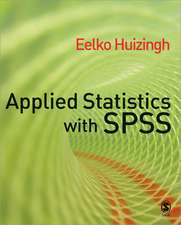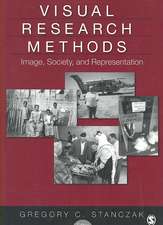Qualitative Research in Political Science: SAGE Library of Political Science
Editat de Joachim Blatter, Markus Haverland, Merlijn van Hulsten Limba Engleză Hardback – 21 aug 2016
Volume One includes papers on the ontological and epistemological foundations of qualitative research, before moving onto articles that compare qualitative with quantitative research, as well as statements that contrast the divergent strands within qualitative research.
Volume Two includes literature that exemplifies the tradition and techniques of cross-case comparisons.
Volume Three is devoted to the spectrum of approaches that focuses on within-case analysis in order to provide evidence for causal claims. The selected works shed light on the corresponding major concepts: causal mechanisms, congruence and process tracing.
Volume Four captures the spectrum of qualitative methods that highlights the importance of context and social constructions (meanings) and is most often summed up as interpretivism: ethnographic and practice approaches as well as discourse, frame and narrative analysis.
Din seria SAGE Library of Political Science
- 26%
 Preț: 4940.12 lei
Preț: 4940.12 lei - 14%
 Preț: 5404.18 lei
Preț: 5404.18 lei - 9%
 Preț: 5383.06 lei
Preț: 5383.06 lei - 26%
 Preț: 4940.24 lei
Preț: 4940.24 lei - 26%
 Preț: 5192.87 lei
Preț: 5192.87 lei - 26%
 Preț: 5187.25 lei
Preț: 5187.25 lei - 26%
 Preț: 4942.00 lei
Preț: 4942.00 lei - 26%
 Preț: 4279.46 lei
Preț: 4279.46 lei - 26%
 Preț: 4280.28 lei
Preț: 4280.28 lei - 11%
 Preț: 4544.33 lei
Preț: 4544.33 lei - 26%
 Preț: 4278.67 lei
Preț: 4278.67 lei - 11%
 Preț: 5237.40 lei
Preț: 5237.40 lei - 11%
 Preț: 4546.22 lei
Preț: 4546.22 lei - 16%
 Preț: 4543.97 lei
Preț: 4543.97 lei - 17%
 Preț: 7582.21 lei
Preț: 7582.21 lei - 26%
 Preț: 4500.77 lei
Preț: 4500.77 lei - 26%
 Preț: 3330.60 lei
Preț: 3330.60 lei - 26%
 Preț: 5192.03 lei
Preț: 5192.03 lei - 26%
 Preț: 5191.92 lei
Preț: 5191.92 lei - 26%
 Preț: 6044.56 lei
Preț: 6044.56 lei
Preț: 5442.05 lei
Preț vechi: 7354.12 lei
-26% Nou
Puncte Express: 8163
Preț estimativ în valută:
1041.69€ • 1093.51$ • 860.49£
1041.69€ • 1093.51$ • 860.49£
Carte tipărită la comandă
Livrare economică 30 ianuarie-13 februarie 25
Preluare comenzi: 021 569.72.76
Specificații
ISBN-13: 9781473918962
ISBN-10: 1473918960
Pagini: 1504
Dimensiuni: 156 x 234 mm
Greutate: 2.86 kg
Ediția:1
Editura: SAGE Publications
Colecția Sage Publications Ltd
Seria SAGE Library of Political Science
Locul publicării:London, United Kingdom
ISBN-10: 1473918960
Pagini: 1504
Dimensiuni: 156 x 234 mm
Greutate: 2.86 kg
Ediția:1
Editura: SAGE Publications
Colecția Sage Publications Ltd
Seria SAGE Library of Political Science
Locul publicării:London, United Kingdom
Recenzii
This carefully selected compendium documents the enormous variation in qualitative political science research – and the dynamic progress it has made over the past decades. The volumes provide an excellent collection for political scientists seeking a systematic overview of the field, and they offer a great resource for teaching research design and methodology.
Blatter, Haverland, and van Hulst deserve our gratitude for bringing together this large and valuable collection of key articles. They make a decisive contribution to further institutionalizing the field of qualitative methods as a well-defined, coherent branch of methodology.
The Sage Major Work on Qualitative Research in Political Science is a superb collection. Drawing together some of the most influential scholars in the field, the editors have produced a methodological dialogue that is truly more than the sum of its parts. Researchers, teachers, and students will find this collection invaluable as an entryway into key debates and developments in the field today.
Blatter, Haverland, and van Hulst deserve our gratitude for bringing together this large and valuable collection of key articles. They make a decisive contribution to further institutionalizing the field of qualitative methods as a well-defined, coherent branch of methodology.
The Sage Major Work on Qualitative Research in Political Science is a superb collection. Drawing together some of the most influential scholars in the field, the editors have produced a methodological dialogue that is truly more than the sum of its parts. Researchers, teachers, and students will find this collection invaluable as an entryway into key debates and developments in the field today.
Cuprins
VOLUME ONE: BACKGROUNDS, PATHWAYS AND DIRECTIONS IN QUALITATIVE METHODOLOGY
Introduction to Volume I
Part One: The Revolt in the US: Alternatives to the Statistical Template
The Science in Social Science - Gary King, Robert O. Keohane and Sidney Verba
Refocussing the Discussion of Methodology - Henry E. Brady, David Collier and Jason Seawright
Studying Cases as Configurations - Charles C. Ragin
Aligning Ontology and Methodology in Comparative Politics - Peter A. Hall
Case Studies and Policy Relevant Theory - Alexander L. George and Andrew Bennett
Part Two: Building on and Defending European Traditions: From Verstehen to Practice and Interpretation
Interpretation and the Sciences of Man - Charles Taylor
Five Misunderstandings about Case Study Research - Bent Flyvbjerg
Interpretive Empirical Political Science: What Makes This Not a Subfield of Qualitative Methods - Dvora Yanow
Part Three: Differentiating Methodological Approaches
A Tale of Two Cultures: Contrasting Quantitative and Qualitative Research - James Mahoney and Gary Goertz
Qualitative Variations: The Sources of Divergent Methodological Approaches - Kendra L. Koivu and Erie Kimball Damman
Relevance and Refinements of Case Studies - Joachim Blatter and Markus Haverland
Part Four: Concept Building as the Analytic Path for Connecting Description and Meaning
Extract from "Guidelines for Concept Analysis" - Giovanni Sartori
Democracy with Adjectives: Conceptual Innovation in Comparative Research - David Collier and Steve Levitsky
Concept Formation in Political Science: An Anti-Naturalist Critique of Qualitative Methodology - Mark Bevir and Asasf Kedar
Part Five: The Call for Transparency: Rigor and/or Reflexivity in Data Collection/Creation
Extract from "Openness in Political Science: Data Access and Research Transparency" - Arthur Lupia and Colin Elman
Conclusion: Research Transparency for a Diverse Discipline - Tim Büthe and Alan M. Jacobs
VOLUME TWO: CAUSAL REGULARITIES, CROSS CASE COMPARISONS, CONFIGURATIONS
Introduction to Volume II
Part One: Classical Statements on Case Comparisons
Comparative Politics and the Comparative Method - Arend Lijphart
Research Designs - Adam Przeworski and Henry Teune
Part Two: Refinements of Case Comparisons
Some Methodological Problems in Comparative Politics - Andrew Murray Faure
On Time and Comparative Research - Stefano Bartolini
Part Three: Case Selection
Insights and Pitfalls: Selection Bias in Qualitative Research - David Collier and James Mahoney
The Possibility Principle: Choosing Negative Cases in Comparative Research - James Mahoney and Gary Goertz
Case Selection Techniques in Case Study Research: A Menu of Qualitative and Quantitative Options - Jason Seawright and John Gerring
Part Four: Configurational Approaches
Qualitative Comparative Analysis (QCA) as an Approach - Dirk Berg-Schlosser, Gisèle De Meur, Benoît Rihoux and Charles C. Ragin
Set Relations in Social Research: Basics Concepts and Fuzzy Sets and Fuzzy-Set Relations - Charles C. Ragin
Where to Begin: A Survey of Five Approaches to Selecting Independent Variables for Qualitative Comparative Analysis - Edwin Amenta and Jane D. Poulsen
A Coincidence Analysis of a Causal Chain: The Swiss Minaret Vote - Michael Baumgartner and Ruedi Epple
Qualitative Comparative Analysis (QCA) and Fuzzy Sets: The Agenda for a Research Approach and a Data Analysis Technique - Claudius Wagemann and Carsten Q. Schneider
Part Five: Correlations versus Configurations
Forms and Problems of Comparison - Ingo Rohlfing
VOLUME THREE: MECHANISMS, TEMPORALITY AND WITHIN-CASE ANALYSIS
Introduction to Volume III
Part One: Mechanisms
Social Mechanisms: An Introductory Essay - Peter Hedström and Richard Swedberg
Mechanisms in the Analysis of Social Macro-Phenomena - Renate Mayntz
Context and Causal Mechanisms in Political Analysis - Tulia G. Falleti and Julia F. Lynch
The Mother of All Isms: Causal Mechanisms and Structured Pluralism in International Relations Theory - Andrew Bennett
Part Two: Temporality
Not Just What, but When: Timing and Sequence in Political Processes - Paul Pierson
Data-Set Observations versus Causal-Process Observations: The 2000 U.S. Presidential Election - Henry Brady
Time Will Tell? Temporality and the Analysis of Causal Mechanisms and Processes - Anna Grzymala-Busse
Set Diagrams and Qualitative Research - James Mahoney and Rachel Sweet Vandrepoel
Part Three: Techniques and Practices of Within-Case Analysis
Study and Theory in Political Science - Harry Eckstein
Case Studies and Theories of Organizational Decision Making - Alexander L. George and Timothy J. McKeown
Tracing Causal Mechanisms - Jeffrey T. Checkel
Systematic Process Analysis: When and How to Use It - Peter A. Hall
In Search of Co-variance, Causal Mechanisms or Congruence? Towards a Plural Understanding of Case Studies - Joachim Blatter and Till Blume
Process Tracing and Causal Inference - Andrew Bennett
Efficient Process Tracing - Frank Schimmelfennig
Turning Observations into Evidence - Derek Beach and Rasmus Brun Pedersen
VOLUME FOUR: INTERPRETIVE AND CONSTRUCTIVIST APPROACHES
Introduction to volume IV
Part One: Meaning-Focused Research
Interpreting Interpretivism Interpreting Interpretations: The New Hermeneutics of Public Administration - Colin Hay
Integrating Rigor and Relevance in Public Administration Scholarship: The Contribution of Narrative Inquiry - Jennifer Dodge, Sonia M. Ospina and Erica Gabrielle Foldy
Symbols - Deborah Stone
Part Two: Ethnography and Field Methods`
Observation, Context, and Sequence in the Study of Politics - Richard F. Fenno, Jr
Reflections on Ethnographic Work in Political Science - Lisa Wedeen
On Writing Fieldnotes: Collection Strategies and Background Expectancies - Nicholas H. Wolfinger
Asking Questions: Techniques for Semistructured Interviews - Beth L. Leech
Part Three: Discourse and Metaphor Analysis
The Study of Discourse in International Relations: A Critique of Research and Methods - Jennifer Milliken
‘Speaking Europe’: The Politics of Integration Discourse - Thomas Diez
Methodological reflections on discourse analysis - Mark Laffey and Jutta Weldes
Supermarkets and Culture Clash: The Epistemological Role of Metaphors in Administrative Practice - Dvora Yanow
Part Four: Framing and Narrative Analysis
Frame-Reflective Policy Discourse - Martin Rein and Donald A. Schön
From Policy “Frames” to “Framing”: Theorizing a More Dynamic, Political Approach - Merlijn van Hulst and Dvora Yanow
Narrative in Political Science - Molly Patterson and Kristen Renwick Monroe
Stories for Research - Steven Maynard-Moody and Michael Musheno
Part Five: Quality Issues
On Improving Qualitative Methods in Public Administration Research - Ralph S. Brower, Mitchel Y. Abolafia and Jered B. Carr
Reflexivity in Research on Civil Society: Constructivist Perspectives - Cecelia Lynch
Introduction to Volume I
Part One: The Revolt in the US: Alternatives to the Statistical Template
The Science in Social Science - Gary King, Robert O. Keohane and Sidney Verba
Refocussing the Discussion of Methodology - Henry E. Brady, David Collier and Jason Seawright
Studying Cases as Configurations - Charles C. Ragin
Aligning Ontology and Methodology in Comparative Politics - Peter A. Hall
Case Studies and Policy Relevant Theory - Alexander L. George and Andrew Bennett
Part Two: Building on and Defending European Traditions: From Verstehen to Practice and Interpretation
Interpretation and the Sciences of Man - Charles Taylor
Five Misunderstandings about Case Study Research - Bent Flyvbjerg
Interpretive Empirical Political Science: What Makes This Not a Subfield of Qualitative Methods - Dvora Yanow
Part Three: Differentiating Methodological Approaches
A Tale of Two Cultures: Contrasting Quantitative and Qualitative Research - James Mahoney and Gary Goertz
Qualitative Variations: The Sources of Divergent Methodological Approaches - Kendra L. Koivu and Erie Kimball Damman
Relevance and Refinements of Case Studies - Joachim Blatter and Markus Haverland
Part Four: Concept Building as the Analytic Path for Connecting Description and Meaning
Extract from "Guidelines for Concept Analysis" - Giovanni Sartori
Democracy with Adjectives: Conceptual Innovation in Comparative Research - David Collier and Steve Levitsky
Concept Formation in Political Science: An Anti-Naturalist Critique of Qualitative Methodology - Mark Bevir and Asasf Kedar
Part Five: The Call for Transparency: Rigor and/or Reflexivity in Data Collection/Creation
Extract from "Openness in Political Science: Data Access and Research Transparency" - Arthur Lupia and Colin Elman
Conclusion: Research Transparency for a Diverse Discipline - Tim Büthe and Alan M. Jacobs
VOLUME TWO: CAUSAL REGULARITIES, CROSS CASE COMPARISONS, CONFIGURATIONS
Introduction to Volume II
Part One: Classical Statements on Case Comparisons
Comparative Politics and the Comparative Method - Arend Lijphart
Research Designs - Adam Przeworski and Henry Teune
Part Two: Refinements of Case Comparisons
Some Methodological Problems in Comparative Politics - Andrew Murray Faure
On Time and Comparative Research - Stefano Bartolini
Part Three: Case Selection
Insights and Pitfalls: Selection Bias in Qualitative Research - David Collier and James Mahoney
The Possibility Principle: Choosing Negative Cases in Comparative Research - James Mahoney and Gary Goertz
Case Selection Techniques in Case Study Research: A Menu of Qualitative and Quantitative Options - Jason Seawright and John Gerring
Part Four: Configurational Approaches
Qualitative Comparative Analysis (QCA) as an Approach - Dirk Berg-Schlosser, Gisèle De Meur, Benoît Rihoux and Charles C. Ragin
Set Relations in Social Research: Basics Concepts and Fuzzy Sets and Fuzzy-Set Relations - Charles C. Ragin
Where to Begin: A Survey of Five Approaches to Selecting Independent Variables for Qualitative Comparative Analysis - Edwin Amenta and Jane D. Poulsen
A Coincidence Analysis of a Causal Chain: The Swiss Minaret Vote - Michael Baumgartner and Ruedi Epple
Qualitative Comparative Analysis (QCA) and Fuzzy Sets: The Agenda for a Research Approach and a Data Analysis Technique - Claudius Wagemann and Carsten Q. Schneider
Part Five: Correlations versus Configurations
Forms and Problems of Comparison - Ingo Rohlfing
VOLUME THREE: MECHANISMS, TEMPORALITY AND WITHIN-CASE ANALYSIS
Introduction to Volume III
Part One: Mechanisms
Social Mechanisms: An Introductory Essay - Peter Hedström and Richard Swedberg
Mechanisms in the Analysis of Social Macro-Phenomena - Renate Mayntz
Context and Causal Mechanisms in Political Analysis - Tulia G. Falleti and Julia F. Lynch
The Mother of All Isms: Causal Mechanisms and Structured Pluralism in International Relations Theory - Andrew Bennett
Part Two: Temporality
Not Just What, but When: Timing and Sequence in Political Processes - Paul Pierson
Data-Set Observations versus Causal-Process Observations: The 2000 U.S. Presidential Election - Henry Brady
Time Will Tell? Temporality and the Analysis of Causal Mechanisms and Processes - Anna Grzymala-Busse
Set Diagrams and Qualitative Research - James Mahoney and Rachel Sweet Vandrepoel
Part Three: Techniques and Practices of Within-Case Analysis
Study and Theory in Political Science - Harry Eckstein
Case Studies and Theories of Organizational Decision Making - Alexander L. George and Timothy J. McKeown
Tracing Causal Mechanisms - Jeffrey T. Checkel
Systematic Process Analysis: When and How to Use It - Peter A. Hall
In Search of Co-variance, Causal Mechanisms or Congruence? Towards a Plural Understanding of Case Studies - Joachim Blatter and Till Blume
Process Tracing and Causal Inference - Andrew Bennett
Efficient Process Tracing - Frank Schimmelfennig
Turning Observations into Evidence - Derek Beach and Rasmus Brun Pedersen
VOLUME FOUR: INTERPRETIVE AND CONSTRUCTIVIST APPROACHES
Introduction to volume IV
Part One: Meaning-Focused Research
Interpreting Interpretivism Interpreting Interpretations: The New Hermeneutics of Public Administration - Colin Hay
Integrating Rigor and Relevance in Public Administration Scholarship: The Contribution of Narrative Inquiry - Jennifer Dodge, Sonia M. Ospina and Erica Gabrielle Foldy
Symbols - Deborah Stone
Part Two: Ethnography and Field Methods`
Observation, Context, and Sequence in the Study of Politics - Richard F. Fenno, Jr
Reflections on Ethnographic Work in Political Science - Lisa Wedeen
On Writing Fieldnotes: Collection Strategies and Background Expectancies - Nicholas H. Wolfinger
Asking Questions: Techniques for Semistructured Interviews - Beth L. Leech
Part Three: Discourse and Metaphor Analysis
The Study of Discourse in International Relations: A Critique of Research and Methods - Jennifer Milliken
‘Speaking Europe’: The Politics of Integration Discourse - Thomas Diez
Methodological reflections on discourse analysis - Mark Laffey and Jutta Weldes
Supermarkets and Culture Clash: The Epistemological Role of Metaphors in Administrative Practice - Dvora Yanow
Part Four: Framing and Narrative Analysis
Frame-Reflective Policy Discourse - Martin Rein and Donald A. Schön
From Policy “Frames” to “Framing”: Theorizing a More Dynamic, Political Approach - Merlijn van Hulst and Dvora Yanow
Narrative in Political Science - Molly Patterson and Kristen Renwick Monroe
Stories for Research - Steven Maynard-Moody and Michael Musheno
Part Five: Quality Issues
On Improving Qualitative Methods in Public Administration Research - Ralph S. Brower, Mitchel Y. Abolafia and Jered B. Carr
Reflexivity in Research on Civil Society: Constructivist Perspectives - Cecelia Lynch









